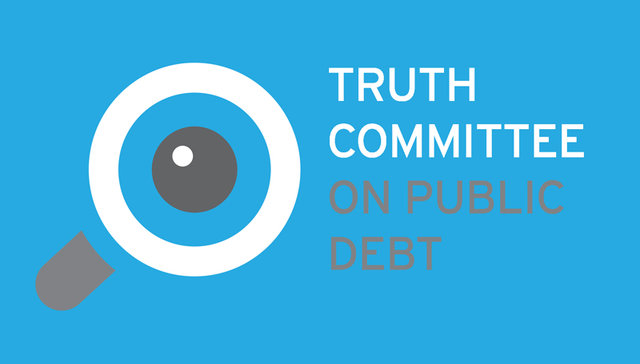Originally published in the PACD’s web site
Political Parties and Audits.
In October 2011, the proposal to do a Citizen Debt Audit of the Spanish debt arose from a meeting between different social movements and organizations, assuming as their own the proposal from social movements in the South. Since then, several political parties have also adopted as their own the proposal of auditing public debt as a tool for fighting against payment of illegitimate debt, both by including such initiative in their electoral programme and by making specific proposals in the institutions where they are present.
It is encouraging that the proposal to analyse the origin, composition, management and impact of the public debt has become a priority to some political parties. To promote and to demand citizens’ right to know what is behind a debt that is being paid with social cuts and reforms, cannot but overjoy us. Nonetheless, we understand that these are distinct proposals that, although complementary, have different objectives and methodologies.
We find equally important that concepts such as illegitimate debt are stopped being used almost exclusively by activists and social movements and become part of the vocabulary of political parties and citizens alike. However, we believe that how illegitimate debt is defined and by whom should not be left in the hands of institutions or politicians, but should be part of a wide and participative citizens’ debate.
A Citizen’s Audit is…
From the PACD we propose the process of a Citizen Audit as an instrument, a mechanism available for all the population to critically analyse the debt policy carried out by the authorities of our country and its impact on the population. We do not want this audit to be an analysis of experts in financial data, but a more profound and extensive analysis. This analysis must include everything: from the cuts on fundamental rights and the environment or the lack of transparency; to the control rights citizens have over the ruling politicians and to promote an active participation in public affairs.
We perceive the Citizen Audit as a process to, collectively, understand how we have arrived at the current situation; what economic, social, cultural, environmental, gender and political impacts has this indebtedness created. Only through collective understanding we can, from an informed citizenship, propose alternatives that truly respond to the needs and interests of the population (and not to the needs of markets, economic elites and creditors). An audit not as a task for experts, but a democratic process of empowerment and popular education. Through this process, we regain control over our economy, our ways of production, consumption and relationship with our surroundings.
The goal is not only to distinguish between legitimate and illegitimate debts, but to denounce a financial system and the allegedly democratic institutions that threaten peoples’ rights and welfare; and at the same time allows us to build new models that will prevent us from falling back into illegitimate debt again.
The citizen’s movement that established itself about a year ago as the PACD, was born with the goal of promoting a change in the social and economic model. We understand that condemning the mechanisms of indebtedness that are the foundation of the world’s economic system and generate profound injustice is another element in the fight against the capitalist system and neoliberal ideology. The Citizen Audit should allow us to walk towards a new economic paradigm that is not based on debt. We want to contribute as well to the retrieval of citizens’ sovereignty through places of learning and participative democracy. Empowering society with tools to fight for transparency, democracy and social justice. Obviously, our final purpose is to “not pay the illegitimate debt and report the culprits, demanding responsibilities”, but to do it from the bottom up, with the majority of the population supporting this demand.
Furthermore, we want this to be done without territorial boundaries (state, provincial or local), therefore addressing the various spheres of institutional debt, showing that this problem is a result of an economic and political dynamic that is beyond borders. Our crisis is the same as in Greece, Cyprus, Portugal or Iceland; but also the same as in Argentina, Ecuador, Tunisia, Zimbabwe or the Philippines. If Debtocracy is global, so should the audit processes be. For this reason, we are coordinated with other similar movements through networks such as ICAN (International Citizen Audit Network).
The process of Citizen Audit that we introduce from the PACD is still to be defined, because we are building it between many. We want there to be, parallel to the analysis of the State’s debt, other audits in different sectors (healthcare, education, environment, gender, electrical industry) and different areas (municipal, provincial and state levels). This makes working collaboratively with other movements and joining forces, resources and efforts even more relevant. Each grassroots movement, each sectoral struggle, each worker’s committee, each local assembly, is a first-hand source of information on what has been involved in the indebtedness process of the multiple public institutions. The same is true for the main impacts of the debt and the austerity measures imposed to pay the debt. In this sense, we understand that the Citizen Audit process should be open to everyone, including political parties (provided that they are not involved in the indebtedness process that is being audited).
We beleive that the proposals for a public debt audit made by various political parties do not replace but complement the task of the Citizen Audit. It is of utmost importance that if achieved, the institutional audits are transparent and can be accessed by the population, and its documents used for the process of a Citizen Audit. It would be equally desirable that the work done so far by citizens, both within and outside the PACD, is recognized at the moment of suggesting in an institution a Public Debt Audit. We can see numerous possibilities in a collaboration between these two processes, as long as there is due recognition of the Citizen Audit process, given that the citizens should be the ones to decide which debt is illegitimate and therefore should not be paid.
A debt is illegitimate when…
“We conclude that there is more than enough evidence of illegitimacy in the generation of the debt that the Spanish Government, together with the EU or the local and provincial governments, are using as justification for their austerity measures. Therefore we demand the right to know, to comprehend the details of the process that has brought us to this situation. We demand a Citizen Debt Audit, an audit that will give us proof of the illegitimacy of this debt and justification to demand NOT TO PAY THE DEBT”. This is how the PACD introduced itself when over a year ago the first state meeting was celebrated with over a hundred activists from the whole territory. But what do we understand by illegitimate debt?
For many years, social movements from the South and the North have been defending that not all debts should be paid. There are debts that imply violations of human rights or economic, social and cultural rights of the population; that threaten the development of a dignified life, that generate inequality, benefiting an elite and harming the majority of the population; that undermine sovereignty or that are the product of corruption or bad management of the government. These debts can be considered illegitimate, unfair or even contrary to international law principles.
There are even debts that can be considered odious. According to international law and the doctrine elaborated by Alexander Sack in 1927, a debt can be considered odious when: (1) it has been contracted by a despotic, dictatorial regime aiming to consolidate its power; (2) it is against the interests of the citizens and/or in the personal interest of the ruling class or people close to power and (3) it is in the lender’s knowledge the odious destiny of the funds (all three conditions should be present).
Contrary to odious debt, illegitimate debt is not a technical or legal concept, defined by experts, but an ideological and political concept. It is in the hands of the population to define, in each historical moment, what is rationally unfair and therefore illegitimate. Thus in the PACD we work with a concept of illegitimate debt that evolves together with the process of the Citizen Audit and not only addresses the financial aspects of debt.
We also understand that a debt can be contracted through fair mechanisms, but cannot be considered legitimate if its payment directly reflects on the welfare and survival of the population. Debts should not “be paid” at the cost of rights and against the will of citizens.
We consider that the legitimacy of institutions and of those who hold political power should come from the population. Nonetheless we live in a time when supposedly “democratic” institutions have lost their legitimacy because they act in detriment to their citizens, and due to this lack of legitimacy, they turn to coercion. In absence of a reference to legitimize politics, the only legitimacy that is still alive, the one that we can evoke, is the will of the people. Therefore it should be through popular will that we define which debts should be paid and why and, on the other hand, which ones should be considered illegitimate and not be paid. It is up to us citizens to establish what is to be paid and what is to be repudiated.
In conclusion, we advocate for a Citizen Audit that defines from bottom up, what debts are illegitimate.
The Debt Audit, no one’s property, everyone’s instrument.
From the PACD we do not want to lecture or impose our vision of what we believe a (citizen) debt audit should be, nor who should define which debt is illegitimate (the people) or how (from bottom up and participative). We understand the Debt Audit as an instrument of multiple functions and methodologies that can be used in different situations.
It is important to distinguish between different audit proposals from political parties and the Citizen Audit proposal, and they are complementary proposals that should not compete but cooperate and grow from one another. Therefore we also understand that it is important not to limit the concept of illegitimate debt to technical or economical issues as has been done in these institutional processes. Each audit process will establish the limits of what it considers illegitimate, but in the end it will be the citizens that will draw the line on what’s unacceptable, on what we don’t owe and therefore will not pay.



